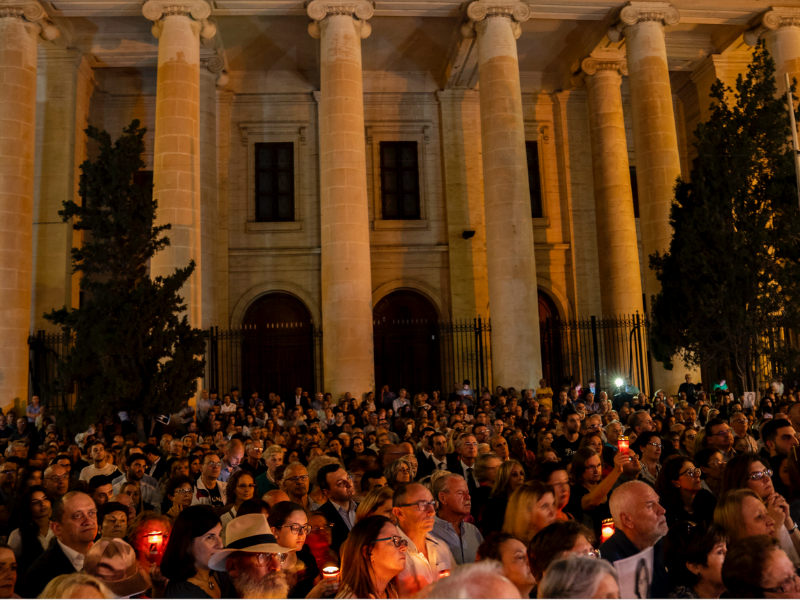The courtroom drama in the compilation of evidence in the case of Yorgen Fenech, the alleged mastermind in the assassination of journalist Daphne Caruana Galizia, has descended into a farce.
Events over the past two days have made the proceedings even more grotesque, and the entire justice system is now on trial.
For those familiar with the workings of the justice system the dismal performance is the manifestation of flaws that have become endemic over the years, and have now gotten worse in the past seven years.
The police have faced a great deal of criticism for their failure to prevent the State witness’ serious injuries through stabbing. It would have been reassuring to have a public inquiry into the circumstances rather than the magisterial inquiry, which will presumably be kept under wraps.
If we had to assume that the witness, Melvin Theuma, had self-harmed as claimed by the police, any criticism of the failure by the police to prevent the incident has to be put in its proper context.
A witness is not a prisoner, and as any lawyer would tell you, you need witness cooperation to ensure the integrity of testimonial evidence. In this sense, subjecting him to close and constant watch could make his life miserable or unbearable, and in turn disgruntled and uncooperative, and likely to make mistakes on the witness stand.
However, even though it’s not easy to determine when someone is suicidal (mental health professional often get it wrong), in this case, the intense pressure on the witness was evident, and it is incomprehensible that the police did not provide him with psychological assistance.
Similarly, it’s hard to justify the lack of electronic surveillance – at the very least, security cameras that keep an eye on all entry and exit points to the flat where he lived.
This brings us back to the court theatrics. It’s often the strategy of defence criminal lawyers to attempt to find inconsistencies that can throw into doubt the integrity of the evidence, or technical errors that can be exploited to make a case for disqualification of part of the evidence.
In pursuit of this, Maltese lawyers often go for heated rhetoric or attacks of the opposing party. It’s become something of a habit, and parties or clients even like it because they get the impression that the lawyer is fighting for them. Magistrates or judges also tend to refrain from employing the full legal tools at their disposal to control the situation.
This contributes to delays in court cases and the rhetoric also tends towards irrelevancies – an indictment of the relatively low standards of the justice system. This applies to criminal as well as civil courts.
The organisation of the judiciary doesn’t help with standards. We have no formal training of the judiciary, for example, contrary to the rest of continental Europe, and no training or systems for efficient court and case management.
Members of the judiciary have traditionally mostly been drawn from political party lines, a trend that has become more brazen since Labour’s return to power in 2013.
Some are very good and hardworking, others are questionable (reading some of the flawed judgments or decrees, it is often not possible to tell whether the flawed reasoning is due to partiality or incompetence).
It’s the same with many court experts – their level of competence, diligence and organisation leaves much to be desired.
Add to this the overburden of work on the judiciary, and it’s not hard to understand why the system is burdened with inefficiencies, poor judgements and decrees. This does not inspire confidence in the justice system.
It was all supposed to change in 2013 when the government-mandated Commission led by former European Court of Human Rights Judge Giovanni Bonello produced an ambitious blueprint for the holistic reform of the justice system. Yet the document has since then gathered dust. The government only implemented parts of it.
Seven years later the government is again making fragmented reform. The current round of reform of the system of judicial appointments and removal (which will remain unworkable due to the human rights rules on objective impartiality) is being carried out hastily under pressure from European institutions.
The Commission for the Administration of Justice, which is supposed to raise the standards of the justice system, is set to remain opaque and mostly absent. Its systems of sanction of the judiciary are unworkable and not accessible to citizens or civil society.
The committee that disciplines lawyers has not worked well over the years. A law to hold lawyers to greater accountability has been in the works for a decade or more. Virtually no one in legal circles has much confidence in the Commission.
This has left us with a justice system in which accountability of its actors is in short supply, and in which travesties of justice are no longer surprising despite the fact that they are unacceptable.












